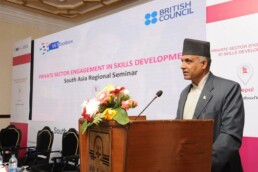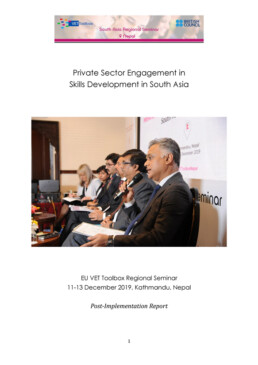South Asia Seminar on Private Sector Engagement in Skills Development

Summary
The British Council delivered an EU VET Toolbox regional seminar on ‘Private Sector Engagement in Skills Development in South Asia’ on 11-13 December 2019 in Kathmandu, Nepal. This by-invitation event was limited to 60 delegates and brought together key stakeholders from policy and practice, including employers, from across the region and beyond to explore shared challenges and practical solutions to engaging employers in skills development.
Although the five countries are different in terms of their starting points and their economic and institutional framework contexts, they all face the same challenge: designing a VET system that supports economic growth and makes the country future-proof. As a consequence, not only the policy framework and the institutional design of VET, but also the acceptance of VET by the private sector is fundamental to ensuring a successful and sustainable system. The private sector is taken to mean both employers, who may be acting in a purely commercial capacity or who may be fulfilling a corporate social responsibility policy, and private, for-profit, training providers.
Only a policy framework which promotes an active participation of the different stakeholders in VET, such as the government, the private sector, educators as well as participants, determines whether VET is a viable and attractive option – for young people as well as for economies.
The specific objectives of the seminar were:
- To analyse private sector engagement in VET in the five countries: Bangladesh, India, Nepal, Pakistan and Sri Lanka.
- To provide a global perspective on the current opportunities and challenges for private sector engagement in skills development.
- To derive transnational policy recommendations to strengthen the role of the private sector and, thus, contribute to skill development in the region.
- To showcase UK, international and regional expertise.
- To showcase VET Toolbox project achievements to date and build engagement with the project in South Asia.
Would you like to know more? Read the post-implementation report.




